Visitors at NIMBioS in 2019
NIMBioS supports short-term visitors to NIMBioS for periods up to one week to assist their efforts in carrying out research that conforms to the mission of NIMBioS to foster research at the interface between mathematics and biology. NIMBioS no longer provides financial support for Sabbatical Fellows, but is open to requests for self-supported visits not needing financial support lasting up to several months duration, with the length of stay determined by the objectives of the proposed project.
Click here for a calendar listing of NIMBioS visitors for the year.
Visitor/Sabbatical Archive
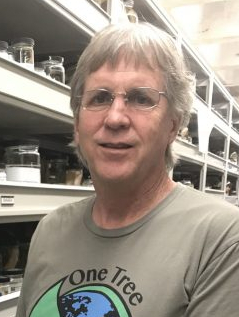 David Swofford (Florida Museum of Natural History)
David Swofford (Florida Museum of Natural History)
Project Title: Porting spatially explicit model of UCE sequence evolution SelON into PAUP
David Swofford, the main developer ofthe phylogenetics software PAUP, is collaborating on a project with Michael Gilchrist and Brian O'Meara to port a spatially explicit model of Ultra Conserved Element (UCE) sequence evolution called SelON into PAUP.
Visit Dates: December 9-13, 2019
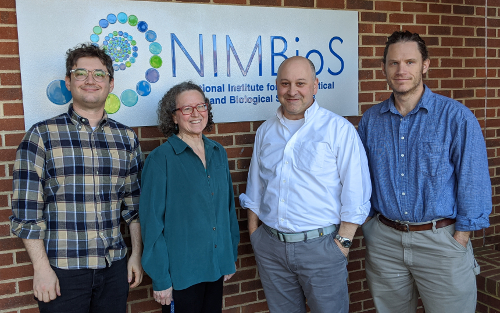 |
(L to R): Kling, Lenhart, Neubert, Sims |
David Kling (Applied Economics, Oregon State Univ., Corvallis); James Sanchirico (Environmental Science and Policy, Univ. of California, Davis); Mike Neubert (Woods Hole Oceanographic Inst.)
Project Title: Matching policy scope to ecosystem scale: Lessons from environmental federalism
David Kling, Mike Neubert, and James Sanchirico, who participated remotely, are collaborating with Charles Sims and Suzanne Lenhart to continue work on a project of the NIMBioS Working Group on Ecosystem Federalism.
Visit Dates: December 4-6, 2019
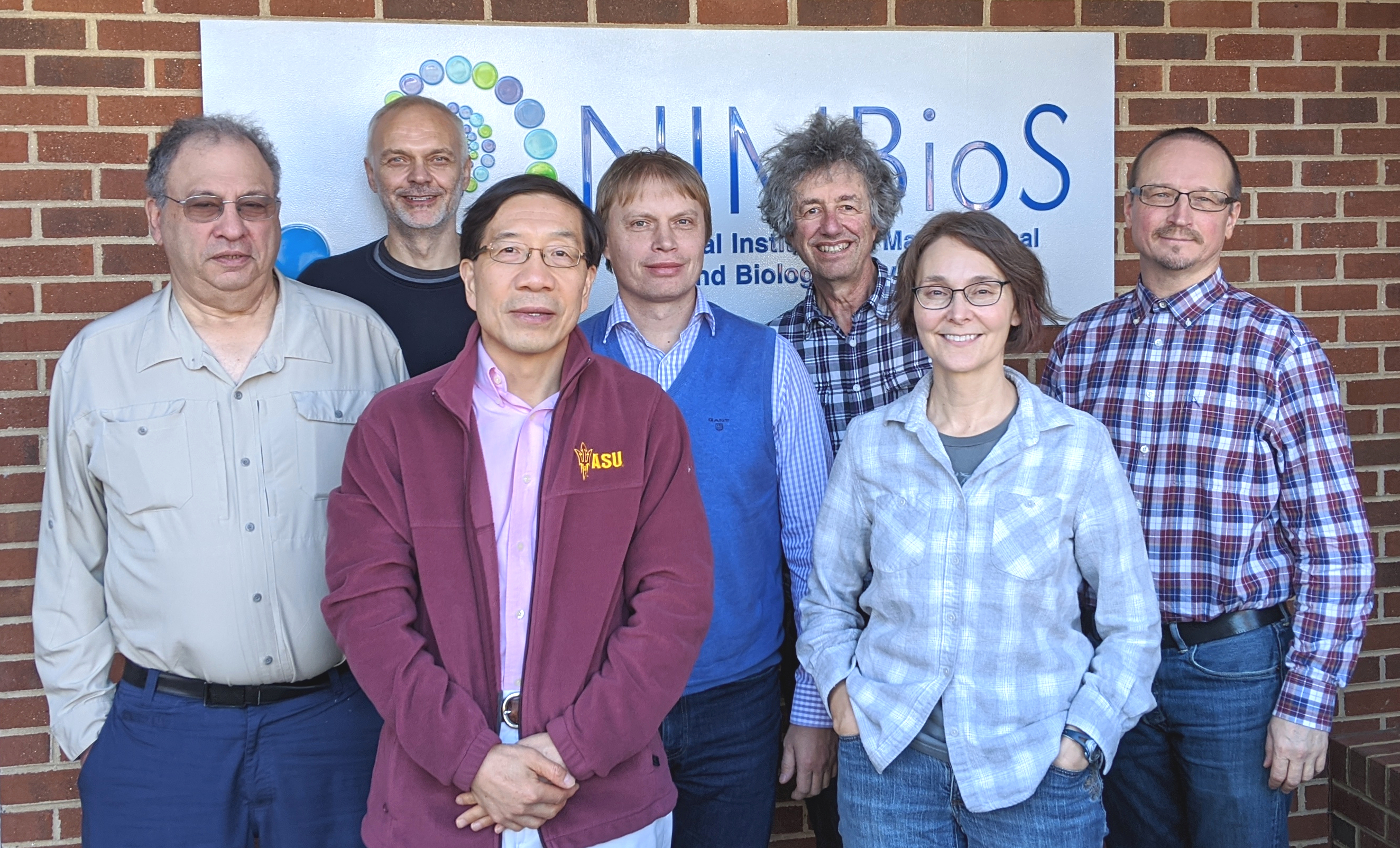 |
(L to R): Levin, Gavrilets, Lai, Morozov, Hastings, Cuddington, Petrovskii |
Kim Cuddington (Biology, Univ. of Waterloo, ON); Tessa Francis (Puget Sound Institute, Univ. of Washington, Tacoma); Alan Hastings (Environmental Science and Policy, Univ. of California, Davis); Ying-Cheng Lai (School of Electrical, Computer and Energy Engineering, Arizona State Univ,Tempe); Simon Levin (Ecology and Evolutionary Biology, Princeton Univ., NJ); Andrew Morozov (Mathematics, Univ. of Leicester, UK); Sergei Petrovskii (Mathematics, Univ. of Leicester, UK)
Project Title: Mismatched transients in the dynamics of social and ecological systems
Kim Cuddington, Alan Hastings, Ying-Cheng Lai, Simon Levin, Andrew Morozov, Sergei Petrovskii and remote participant Tessa Francis are collaborating with Sergey Gavrilets on a project to determine if timescale mismatches in opinion and ecological change may be an important factor in societal responses to environmental crises.
Visit Dates: November 25-26, 2019
DySoC/NIMBioS Seminar. Simon Levin on Public goods, from biofilms to societies. Nov 25
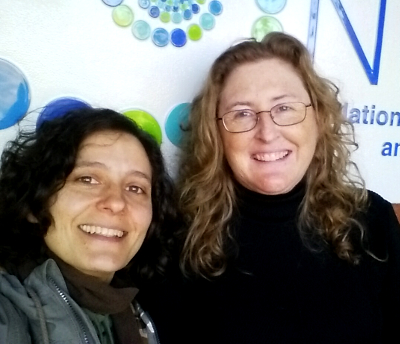 |
(L to R): Papeş, Maguire |
Karen Maguire (Economics, Oklahoma State Univ.)
Project Title: Pecking order? Fracking boom and bird populations on the High Plains of Colorado
Karen Maguire is collaborating on a project with Mona Papeş to apply an ecological economics approach to investigate the effects of fracking on bird habitat in Colorado.
Visit Dates: November 21-27, 2019
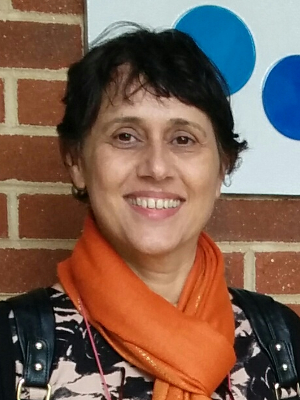
Marinez Ferreira de Siqueira (Rio de Janeiro Botanical Garden Research Institute)
Project Title: Scalable computational framework to assess climate change impacts and anthropogenic changes in Atlantic Rainforest biodiversity from a restoration perspective
Marinez Ferreira de Siqueira is collaborating with Mona Papeş on research in spatial analysis of Brazilian biodiversity, plant ecology, ecological modeling, species conservation, biodiversity data, information systems, scalable and reproducible workflows for ecological niche models.
Visit Dates: October 27-29, 2019
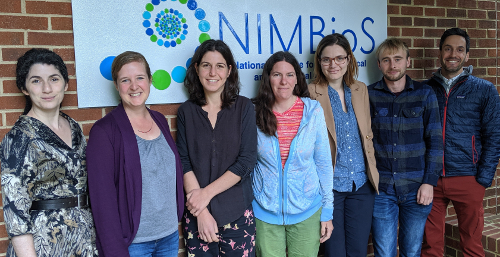 |
(L to R): Fefferman, Hobson, Shai, Pinter-Wollman, Puck Rombach, Silk, Larremore |
Noa Pinter-Wollman (Ecology and Evolutionary Biology, UCLA); Elizabeth Hobson (Bio Sciences, Univ. of Cincinnati); Daniel Larremore (Computer Science, Univ. of Colorado Boulder); Michaela Puck Rombach (Math & Stats, Univ. of Vermont); Saray Shai (Comp Sci, Wesleyan Univ.); Matthew Silk (Ecology and Conservation, Univ of Exeter);
Project Title: Null models in social behavior
Noa Pinter-Wollman, Elizabeth Hobson, Daniel Larremore, Michaela Puck Rombach, Saray Shai, and Matthew Silk are collaborating with Nina Fefferman on a project to develop an adaptive framework for generating biologically relevant null models to study animal social behavior.
Visit Dates: October 24-26, 2019
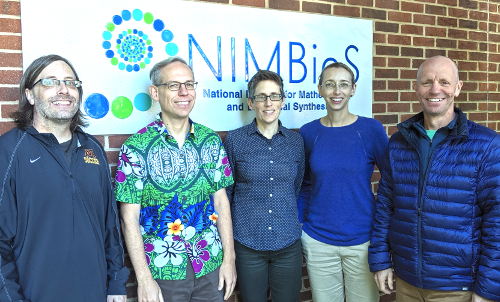 |
(L to R): Zieffler, Larson, Stanhope, Grayson, Overvoorde |
Liz Stanhope (Lewis & Clark College); Kristine Grayson (Univ. of Richmond); Erik Larson (Macalester College); Paul Overvoorde (Macalester College); Andrew Zieffler (Univ. of Minnesota)
Project Title: Facilitating assessment of undergraduate quantitative skills
Liz Stanhope, Kristine Grayson, Erik Larson, Paul Overvoorde, and Andrew Zieffler are collaborating with Suzanne Lenhart and Louis Gross on a project to assess quantitative literacy in undergraduate biology education.
Visit Dates: October 18-19, 2019
Visit Report (pdf)
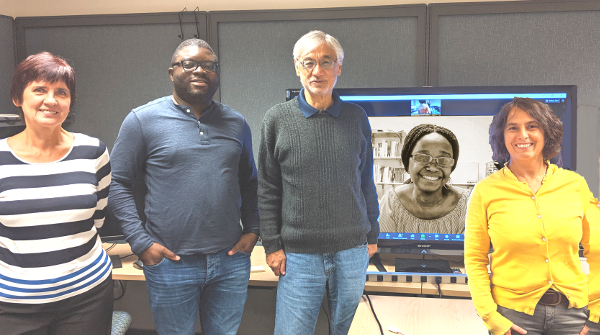 |
(L to R): Hritonenko, Gaoue, Chen-Charpentier, Leite. Remote participant: Agusto |
Maria Leite (Mathematics and Statistics, Univ. of South Florida); Benito Chen-Charpentier (Mathematics, Univ. of Texas); Natali Hritonenko (Mathematics, Prairie View A&M Univ., TX); Folashade Agusto (Ecology & Evolutionary Biology, Univ. of Kansas)
Project Title: Plant sustainability under virus co-infection and harvesting
Maria Leite, Benito Chen-Charpentier, Natali Hritonenko, and Folashade Agusto are collaborating with Orou Gaoue (Ecology & Evolutionary Biology) on a project to study plant sustainability under virus co-infection and harvesting using data integration within a mathematical framework.
Visit Dates: October 18-21, 2019
Visit Report (pdf)
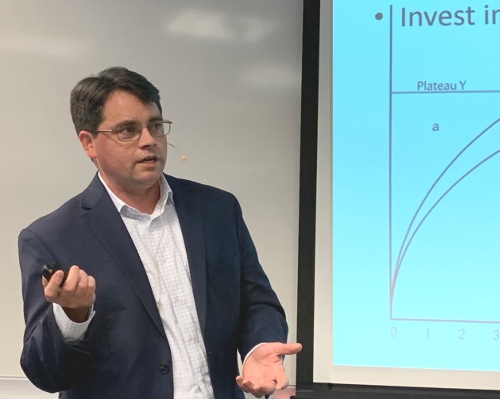
Luke J. Matthews, Behavioral and Social Scientist, RAND Corporation; Faculty, Pardee RAND Graduate School; Co-Director, RAND Center for Applied Network Analysis and System Science
Visit Dates: October 15, 2019
DySoC/NIMBioS Seminar. Cultural inheritance mechanics: Their affordances for evolutionary adaptation and applications to policy analysis, October 15, 3:30 p.m., Hallam Auditorium (Rm 206), NIMBioS
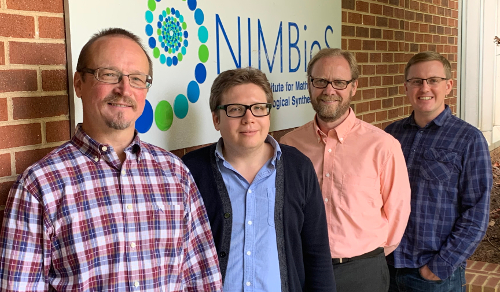 |
(L to R): Petrovskii, Sudakov, Sumrall, Witts (Not pictured: Carlson who participated remotely) |
Ivan Sudakov (Physics, Univ. of Dayton); Sergei Petrovskii (Mathematics, Univ. of Leicester, UK); James D. Witts (Earth & Planetary Sciences, Univ. of New Mexico); Colin Carlson (Biology, Georgetown Univ.)
Project Title: Nonlinearity in past mass extinctions
Ivan Sudakov, Sergei Petrovskii, James D. Witts, and Colin Carlson are collaborating with Colin D. Sumrall (Paelobiologist, Earth and Planetary Sciences, Univ. of Tennessee, Knoxville) to develop new methodologies arising from nonlinear and stochastic theories to model past mass extinctions caused by global climate change.
Visit Dates: October 10-11, 2019
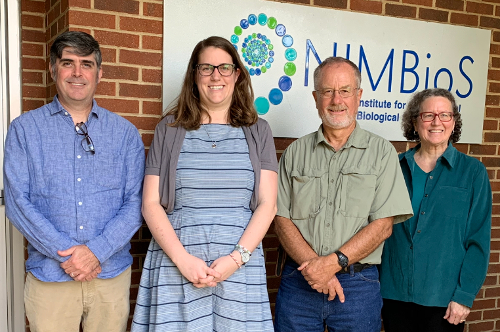 |
(L to R): Wiggins, Thompson, McAvoy, Lenhart |
Tom McAvoy (Quarantine Lab, Entomology, Virginia Tech)
Project Title: Mathematical modeling of population dynamics and interactions among HWA and two predatory beetles
Tom McAvoy is collaborating with Suzanne Lenhart, Greg Wiggins, and UT math graduate student Hannah Thompson on a project to discuss mathematical modeling of population dynamics and interactions among HWA and two predatory beetles.
Visit Dates: October 8-9, 2019
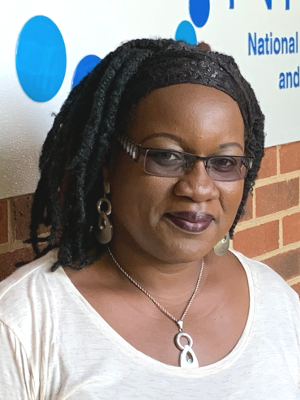
Etotépé Aïkpémi Sogbohossou (Conservation Biology, Univ. of Abomey-Calavi, Cotonou, Benin)
Etotépé Aïkpémi Sogbohossou, a lecturer at the University of Abomey-Calavi, Cotonou, Benin and a Schlumberger Faculty for Future postdoctoral fellow, is visiting to collaborate with Mona Papeş and the NIMBioS Spatial Analysis Lab on niche modeling of species of concern in Benin.
Visit Dates: September 26 – December 5, 2019
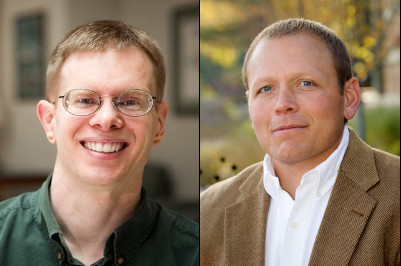 |
(L to R): Horan, Finnoff |
Richard Horan (Agricultural, Food, and Resource Economics, Michigan State Univ.); David Finnoff (Economics and Finance, Univ. Wyoming)
Project Title: Incorporating environmental and demographic stochasticity into bioeconomic models of optimal renewable resource management
Richard Horan and David Finnoff are collaborating with Charles Sims on a project to extend previous work by applying a theoretical model to two species (harp seals and grizzly bears) where data exist to parameterize both environmental and demographic stochasticity for a harvested population.
Visit Dates: September 24-26, 2019
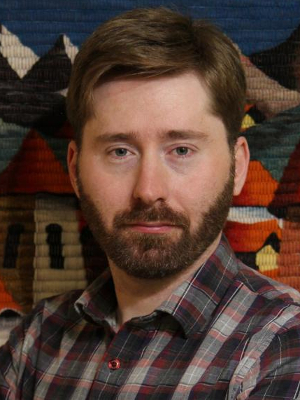
Jeremy Van Cleve, Biology, Univ. of Kentucky
Visit Dates: September 10-11, 2019
DySoC/NIMBioS Seminar. Components of cooperation: Synergy in structured populations and the evolution of guilt, Sep 10, 3:30 p.m., Hallam Auditorium (Rm 206), NIMBioS
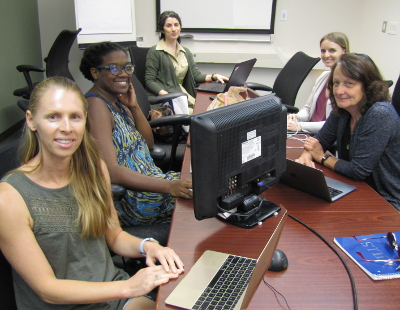 |
(L to R): Hohn, Wilson, Fefferman, Brooks, Radunskaya. Not pictured: Price and Sindi (who both participated remotely), Williams |
Heather Brooks (Mathematics, UCLA), Maryann Hohn (Mathematics, Pomona College), Candice Price (Mathematics, Smith College), Ami Radunskaya (Mathematics, Pomona College), Suzanne Sindi (Mathematics, UC Merced), Nakeya Williams (U.S. Merchant Marine Academy), and Shelby Wilson (Biology, Univ. of Maryland)
Project Title: Parasite risks and the evolution of social behaviors and emergent population organization
Heather Brooks, Maryann Hohn, Candice Price, Ami Radunskaya, Suzanne Sindi, Nakeya Williams, and Shelby Wilson are collaborating with Nina Fefferman on a project to study parasite risks and the evolution of social behaviors and emergent population organization.
Visit Dates: August 25-31, 2019

Gary C. An (Division of Acute Care Surgery, Univ. of Vermont Larner College of Medicine)
Project Title: Control discovery techniquesGary C. An is collaborating on a project with Judy Day on control discovery techniques applied to mathematical models for acute care.
Visit Dates: August 7-9, 2019
Visit Report (pdf)
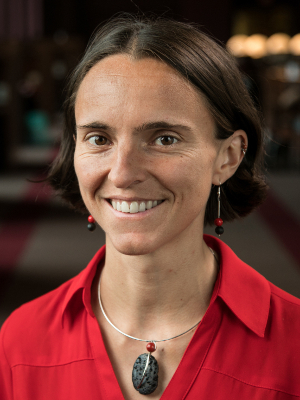
Lauren Childs (Mathematics, Virginia Tech)
Project Title: Modeling malaria parasite diversity
Lauren Childs is collaborating on a project with Nina Fefferman to model malaria parasite diversity.
Visit Dates: July 29-August 3, 2019
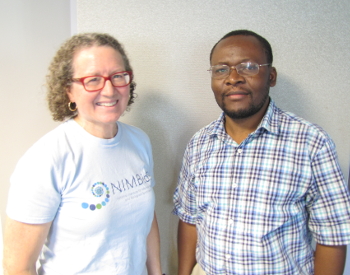 |
(L to R): Lenhart, Numfor |
Eric Numfor (Mathematics, Agusta College)
Project Title: Cell-to-cell model of the human immunodeficiency virus (HIV)
Eric Numfor is collaborating on a project with Suzanne Lenhart to develop a cell-to-cell model of the human immunodeficiency virus.
Visit Dates: July 21-26, 2019
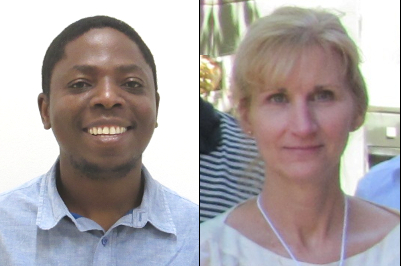 |
(L to R): Magombedze, Stabel |
Gesham Magombedze (Center for Infectious Diseases Research and Experimental Therapeutics, Baylor Health Care) and Judith Stabel (USDA, Infectious Bacterial Diseases Research: Ames, IA)
Project Title: Mathematical and biological modeling of Johne's disease immunology
Gesham Magombedze and Judith Stabel are collaborating with Shigetoshi Eda on a project to model Johne's disease immunology.
Visit Dates: July 16-18, 2019
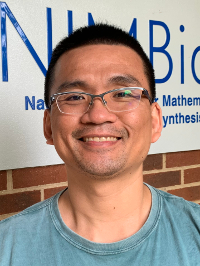
Tony Jhwueng (Statistics, Feng-Chia Univ.)
Project Title: Studying Phylogenetic Trait Evolution through Bridge Processes
Tony Jhwueng is collaborating on a project with Brian O'Meara to create a novel method for trait evolution modeling using Bridge processes.
Visit Dates: July 15-August 2, 2019
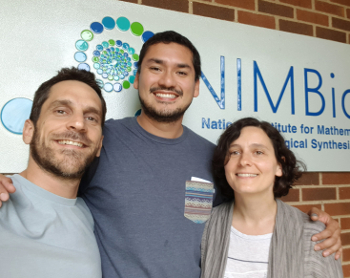 |
(L to R): Carrasco Tornero, Martinez, Papeş |
Oscar Martinez (Mathematics, El Colegio de la Frontera Sur)
Project Title: Conservation status of Mesoamerican bees
Oscar Martinez is collaborating with Mona Papeş and Luis Carrasco Tornero on a project using spatial ecology tools to assess the conservation status of Mesoamerican bees.
Visit Dates: July 14-31, 2019
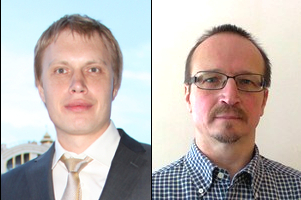 |
(L to R): Morozov, Petrovskii |
Andrew Morozov (Mathematics, Univ. of Leicester, UK) and Sergei Petrovskii (Mathematics, Univ. of Leicester, UK)
Andrew Morozov and Sergei Petrovskii continued collaboration with Sergey Gavrilets stemming from the Long Transients Working Group meeting.
Visit Dates: May 10-17, 2019
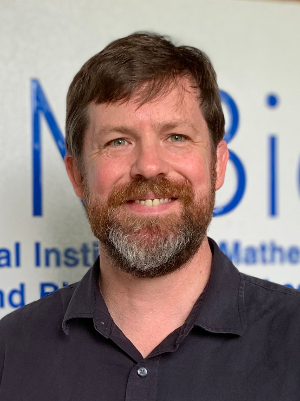
Jason Bintz (Mathematics, Johnson Univ., Tennessee)
Jason Bintz is working on two projects with Suzanne Lenhart. One project involves the use of optimal control theory for resource allocation in population models with spatial and temporal features. Partial differential equations are used to represent the movement and growth of the populations. The second part is the construction and analysis of a model for the infectious disease, Clostridioides difficile, in setting with a hospital and a community. This modeling may help to design better management and vaccination policies. Bintz is a former NIMBioS Graduate Research Assistant.
Visit Dates: May 29-June 3, 2019
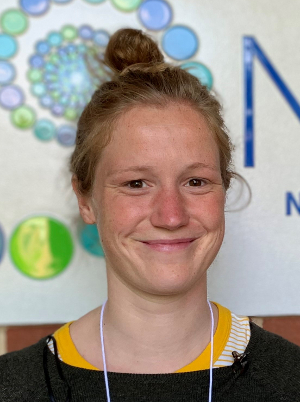
Irina Vortkamp (Mathematics & Computer Science, Osnabrück Univ.)
Irina Vortkamp is collaborating on a project with Suzanne Lenhart to investigate optimization methods for discrete time models in agricultural land use.
Visit Dates: May 28-31, 2019
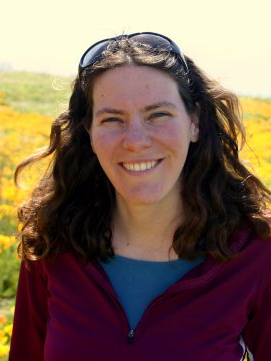
Noa Pinter-Wollman (Ecology & Evolutionary Biology, Univ. of California, Los Angeles)
Project Title: Developing topological tools for multiscale feedback in collaborative behavioral systems
Noa Pinter-Wollman is collaborating on a project with Nina Fefferman to develop a topological model for multiscale feedback in collaborative behavioral systems.
Visit Dates: May 6-9, 2019
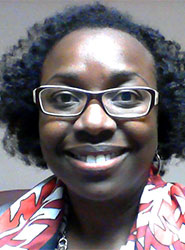
Sally Seraphin (Behavioral Neuroscience, Centre College)
Sally Seraphin is collaborating with N. Fefferman to study accelerated developmental maturation and ageing associated with early adversity.
Visit Dates: May 1-31, 2019
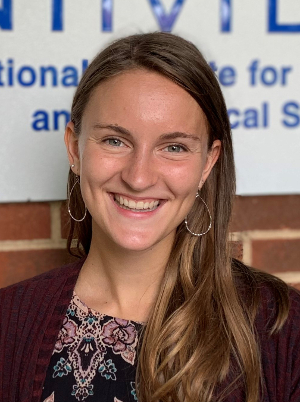
Brielle Kwarta (Mathematics, Univ. of Washington)
Brielle Kwarta participated in the 2018 Summer Research Experiences for Undergraduates program. She is working on extensions of the SRE project on economic modeling of free-roaming cats in Knox County. Charles Sims, Suzanne Lenhart and Kwarta are collaborating on this project to design management strategies to balance the benefits and the costs of control programs. Kwarta begins a graduate program in fall 2019 at the University of Washington.
Visit Dates: May 1-June 30, 2019
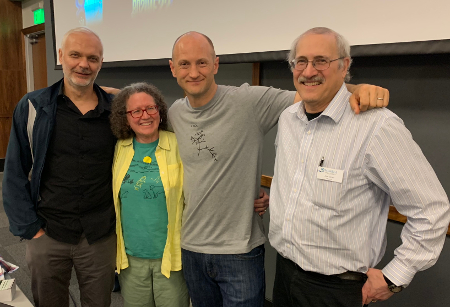 |
(L to R): Gavrilets, Lenhart, Brinkman, Gross |
Baba Brinkman (Rap artist and playwright)
Performance: New York based rap artist and playwright Baba Brinkman performed the world premiere of his Rap Guide to Culture on April 23. Baba is best known for his "Rap Guide" series of science-based hip-hop albums and theater shows, now playing off-Broadway. He also performed one of his signature "rap-ups" as a part of the DySoC/NIMBioS Investigative Workshop on Social Norms.
Visit Dates: April 23-24, 2019
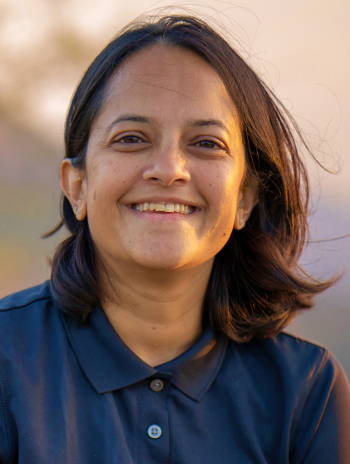
Krithi K. Karanth (Executive Director, Centre for Wildlife Studies, Bangalore; Assoc. Conservation Scientist, Wildlife Conservation Society, New York; Adjunct Asst. Professor, Duke Univ.)
Project Title: Resolving human-wildlife conflict with innovative social-ecological solutions
Collaborator: NIMBioS Postdoctoral Fellow Charlotte Chang
Visit Dates: April 10-14, 2019
Seminar: Living with Wildlife: Insights from conservation research, technology and education programs in India, April 11, 1-2:30 p.m., Toyota Auditorium (room 103), Howard H. Baker Jr. Center for Public Policy, 1640 Cumberland Ave.
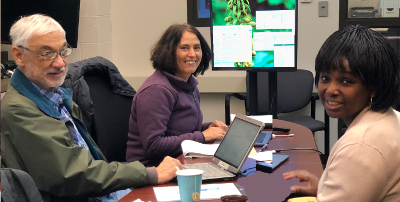 |
(L to R): Chen, Leite, Agusto. Not pictured: Gaoue |
Maria Leite (Mathematics and Statistics, Univ. of South Florida), Benito Chen (Mathematics, Univ. of Texas Arlington), Folashade Agusto (Ecology & Evolutionary Biology, Univ. of Kansas)
Project Title: Sustainability of harvesting non-timber forest products in fragmented landscape: A mathematical framework
Maria Leite, Benito Chen, and Folashade Agusto are collaborating on a project with Orou Gaoue to develop a mathematical framework for the sustainability of harvesting non-timber forest products in a fragmented landscape.
Visit Dates: February 8-11, 2019
NIMBioS
1122 Volunteer Blvd., Suite 106
University of Tennessee
Knoxville,
TN 37996-3410
PH: (865) 974-9334
FAX: (865) 974-9461
Contact NIMBioS


